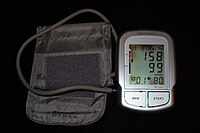
Photo from wikipedia
Abstract We aim to determine whether nebivolol has a better effect on endothelial dysfunction compared with other β-blockers or other classes of antihypertensive drugs. Searches of the PubMed, Embase etc.… Click to show full abstract
Abstract We aim to determine whether nebivolol has a better effect on endothelial dysfunction compared with other β-blockers or other classes of antihypertensive drugs. Searches of the PubMed, Embase etc. were performed to analyze all the randomized controlled trials using nebivolol to treat essential hypertension. The primary end points included a measurement of peripheral endothelial function by brachial flow mediated vasodilatation (FMD) or forearm blood flow (FBF). A random-effect model was used to perform the meta-analysis when the studies showed significant heterogeneity, otherwise a descriptive analysis was conducted. Ten studies (689 patients) were included in qualitative analysis, four of which were included in quantitative synthesis. Meta-analysis showed that the changed FMD value before and after treatment with nebivolol was not statistically different from those treated with other β-blockers [mean difference = 1.12, 95% confidence interval (CI): −0.56, 2.81, P=0.19]. Descriptive analysis indicated that nebivolol did not have a better endothelium-protective effect than other classes of antihypertensive drugs including olmesartan and perindopril. Nebivolol is not a unique endothelial function-protective agent distinguished from other β-blockers or other classes of antihypertensive drugs. Reversal of endothelial dysfunction is a key point in the prevention and therapy of essential hypertension.
Journal Title: Bioscience Reports
Year Published: 2020
Link to full text (if available)
Share on Social Media: Sign Up to like & get
recommendations!